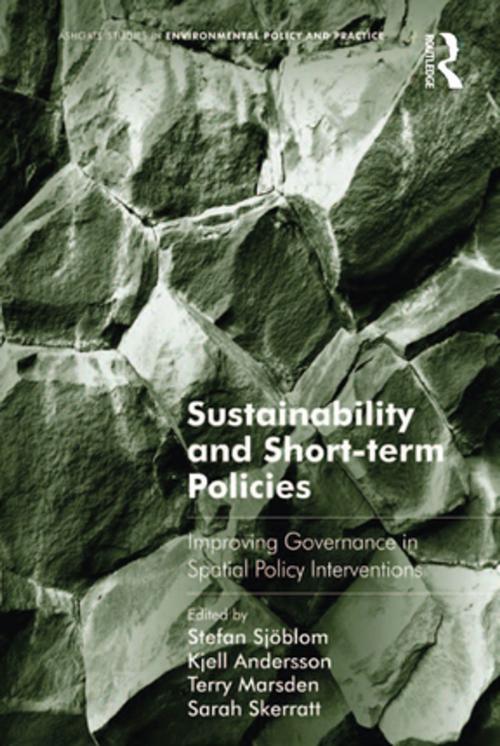Sustainability and Short-term Policies
Improving Governance in Spatial Policy Interventions
Nonfiction, Science & Nature, Nature, Environment, Environmental Conservation & Protection| Author: | Stefan Sjöblom, Kjell Andersson, Sarah Skerratt | ISBN: | 9781317047971 |
| Publisher: | Taylor and Francis | Publication: | April 1, 2016 |
| Imprint: | Routledge | Language: | English |
| Author: | Stefan Sjöblom, Kjell Andersson, Sarah Skerratt |
| ISBN: | 9781317047971 |
| Publisher: | Taylor and Francis |
| Publication: | April 1, 2016 |
| Imprint: | Routledge |
| Language: | English |
There has been a profound change within the sphere of government and societal regulation in recent years. Traditional hierarchical government has been challenged by new governance instruments relying on negotiations instead of command and control. Alongside this development there has been a change in the time-framing of politics and steering. Traditional politics implicitly has been based on stability and permanence while new forms of governance explicitly are based on just-in-time actions such as projects and issue-based collaborations in networks and programs. This book analyses the implications of this shortening of time frames, focusing particularly on spatial policy interventions. Spatial policies have a special relevance when it comes to governance and new forms of societal steering. On the one hand, the local (geographical) level in politics is the principal battleground for the struggle between top down and bottom up approaches and aspirations. On the other hand, many of the most burning issues of our time require a global, strategic approach, for example, climate change, resource depletion, population growth are anchored in space and the physical world. Whether and how short-term spatial approaches can achieve sustainable development outcomes is thus a critical question, and forms the focus of this volume. The book examines the characteristics of temporary policy measures across a range of rural, urban and regional contexts, in four continents: Europe, North America, Oceania and Africa. The outcomes and effects of these policies and interventions are analysed, particularly focusing on the tension between short-term interventions and long-term effects.
There has been a profound change within the sphere of government and societal regulation in recent years. Traditional hierarchical government has been challenged by new governance instruments relying on negotiations instead of command and control. Alongside this development there has been a change in the time-framing of politics and steering. Traditional politics implicitly has been based on stability and permanence while new forms of governance explicitly are based on just-in-time actions such as projects and issue-based collaborations in networks and programs. This book analyses the implications of this shortening of time frames, focusing particularly on spatial policy interventions. Spatial policies have a special relevance when it comes to governance and new forms of societal steering. On the one hand, the local (geographical) level in politics is the principal battleground for the struggle between top down and bottom up approaches and aspirations. On the other hand, many of the most burning issues of our time require a global, strategic approach, for example, climate change, resource depletion, population growth are anchored in space and the physical world. Whether and how short-term spatial approaches can achieve sustainable development outcomes is thus a critical question, and forms the focus of this volume. The book examines the characteristics of temporary policy measures across a range of rural, urban and regional contexts, in four continents: Europe, North America, Oceania and Africa. The outcomes and effects of these policies and interventions are analysed, particularly focusing on the tension between short-term interventions and long-term effects.















